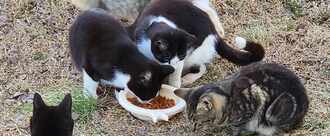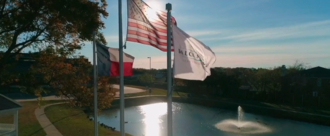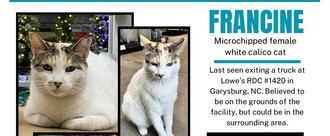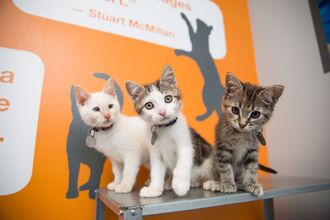-
Stop The Cat Feeding Ban in Herrin, ILBecause this isn’t just about cats — it’s about what kind of community we want to be. When a city starts punishing compassion, it sends a message that kindness doesn’t matter — that people who feed the hungry and protect the vulnerable are the problem. That’s wrong. This ordinance doesn’t just threaten Herrin’s community cats — it threatens the values of empathy, humanity, and cooperation that hold small towns together. People should join this campaign because what’s happening in Herrin could happen anywhere. If we stay silent, we allow cruelty and overreach to replace compassion and common sense. Together, we can show that working with the community works, that TNR is humane and effective, and that good people won’t be bullied out of doing what’s right.1,785 of 2,000 SignaturesCreated by Katie B.
-
Bring No-Kill to Guthrie Animal Shelter!To become a no-kill shelter, 90% of the animals need a live outcome. The Guthrie Animal Shelter is already so close to reaching this milestone, but they need community's help. Recently, the City of Guthrie took an important step forward by passing a community cat ordinance, showing a strong commitment to humane and effective solutions for cats in the community. This progress demonstrates what is possible when residents, local leaders, and shelters work together! Let's keep that momentum going and show Guthrie Animal Shelter staff and leadership how much their work means to the community by showing up to adopt, foster and volunteer! Together, we can make the Guthrie Animal Shelter no-kill!11 of 100 SignaturesCreated by Clarisse R.
-
Bring No-Kill to Canadian County!To become a no-kill shelter, 90% of the animals need a live outcome. The El Reno Animal Shelter and Yukon Animal Control are so close, but they need community help. Let's show the shelter staff and leadership how much their work means to the community by showing up to adopt, foster and volunteer! Together, we can make Canadian County a no-kill community!4 of 100 SignaturesCreated by Clarisse R.
-
Bring no-kill to Balch Springs, TXTo become a no-kill shelter, 90% of the animals need a live outcome. Balch Springs Animal Services is so close, but they need the community's help. Let's show the shelter staff and leadership how much their work means to the community by showing up to adopt, foster and volunteer!5 of 100 SignaturesCreated by Action Team
-
Bring no-kill to Jasper, TXTo become a no-kill shelter, 90% of the animals need a live outcome. City of Jasper Animal Control and Shelter is so close, but they need the community's help. Let's show the shelter staff and leadership how much their work means to the community by showing up to adopt, foster and volunteer!5 of 100 SignaturesCreated by Action Team
-
Bring no-kill to Alvarado, TXTo become a no-kill shelter, 90% of the animals need a live outcome. The City of Alvarado Animal Control is so close, but they need the community's help. Let's show the shelter staff and leadership how much their work means to the community by showing up to adopt, foster and volunteer!5 of 100 SignaturesCreated by Katie F.
-
Bring no-kill to Tarrant CountyTo become a no-kill shelter, 90% of the animals need a live outcome. The City of Hurst and Watauga Animal Services are so close, but they need community help. Let's show the shelter staff and leadership how much their work means to the community by showing up to adopt, foster and volunteer!33 of 100 SignaturesCreated by Action Team
-
Urgent Action to Recover Francine, the Missing Lowe’s CatTogether, we can bring Francine home. We urge Lowe’s to act with transparency, compassion, and urgency. Please add your name below to show your support and help ensure every possible step is taken for Francine’s safe return. For latest updates, check the Instagram account @WheresFrancine To find out more about how to help, visit https://tinyurl.com/WheresFrancineHowToHelpRVA #WHERESFRANCINE9,458 of 10,000 SignaturesCreated by Wheres F.
-
Tell Salem City Council: Support Lifesaving Programs for CatsIn 2024, over 4,300 cats entered Utah County shelters, and only 60% made it out alive. Community cats (aka stray or free-roaming cats) are losing their lives simply because they've made a home outdoors. In many cases, they are brought to NUVAS or SUVAS where they have a 40% chance of being killed. Many of these cats thrive living outdoors because community members care for and about them. That's where community cat programs come in. These programs use trap-neuter-vaccinate-return (TNVR) to save cats. The process is simple: Community cats are trapped, evaluated by veterinarians, vaccinated, spayed or neutered, ear-tipped, and returned to their outdoor homes, unable to have kittens. Lifesaving programs like these are proven to be the most cost-effective, veterinarian-approved, and animal-friendly solutions for improving the health of and reducing free-roaming cat populations. By aligning city ordinances with state law, Utah County can save lives, reduce taxpayer costs, and build healthier, safer communities for both people and pets. Reference the facts: Utah Code Community Cat Act 11-46-301 - https://le.utah.gov/xcode/Title11/Chapter46/C11-46-P3_1800010118000101.pdf Community cats and public health: https://www.felineresearch.org/post/issue-brief-feral-cats-and-public-health TNR and population management: https://www.felineresearch.org/post/issue-brief-what-to-do-with-feral-cats-examining-tnr Cat health and welfare with TNR: https://www.felineresearch.org/post/issue-brief-feral-cat-health4 of 100 Signatures
-
Tell Goshen City Council: Support Lifesaving Programs for CatsIn 2024, over 4,300 cats entered Utah County shelters, and only 60% made it out alive. Community cats (aka stray or free-roaming cats) are losing their lives simply because they've made a home outdoors. In many cases, they are brought to NUVAS or SUVAS where they have a 40% chance of being killed. Many of these cats thrive living outdoors because community members care for and about them. That's where community cat programs come in. These programs use trap-neuter-vaccinate-return (TNVR) to save cats. The process is simple: Community cats are trapped, evaluated by veterinarians, vaccinated, spayed or neutered, ear-tipped, and returned to their outdoor homes, unable to have kittens. Lifesaving programs like these are proven to be the most cost-effective, veterinarian-approved, and animal-friendly solutions for improving the health of and reducing free-roaming cat populations. By aligning city ordinances with state law, Utah County can save lives, reduce taxpayer costs, and build healthier, safer communities for both people and pets. Reference the facts: Utah Code Community Cat Act 11-46-301 - https://le.utah.gov/xcode/Title11/Chapter46/C11-46-P3_1800010118000101.pdf Community cats and public health: https://www.felineresearch.org/post/issue-brief-feral-cats-and-public-health TNR and population management: https://www.felineresearch.org/post/issue-brief-what-to-do-with-feral-cats-examining-tnr Cat health and welfare with TNR: https://www.felineresearch.org/post/issue-brief-feral-cat-health1 of 100 Signatures
-
Tell Genola City Council: Support Lifesaving Programs for CatsIn 2024, over 4,300 cats entered Utah County shelters, and only 60% made it out alive. Community cats (aka stray or free-roaming cats) are losing their lives simply because they've made a home outdoors. In many cases, they are brought to NUVAS or SUVAS where they have a 40% chance of being killed. Many of these cats thrive living outdoors because community members care for and about them. That's where community cat programs come in. These programs use trap-neuter-vaccinate-return (TNVR) to save cats. The process is simple: Community cats are trapped, evaluated by veterinarians, vaccinated, spayed or neutered, ear-tipped, and returned to their outdoor homes, unable to have kittens. Lifesaving programs like these are proven to be the most cost-effective, veterinarian-approved, and animal-friendly solutions for improving the health of and reducing free-roaming cat populations. By aligning city ordinances with state law, Utah County can save lives, reduce taxpayer costs, and build healthier, safer communities for both people and pets. Reference the facts: Utah Code Community Cat Act 11-46-301 - https://le.utah.gov/xcode/Title11/Chapter46/C11-46-P3_1800010118000101.pdf Community cats and public health: https://www.felineresearch.org/post/issue-brief-feral-cats-and-public-health TNR and population management: https://www.felineresearch.org/post/issue-brief-what-to-do-with-feral-cats-examining-tnr Cat health and welfare with TNR: https://www.felineresearch.org/post/issue-brief-feral-cat-health4 of 100 Signatures
-
Tell American Fork City Council: Support Lifesaving Programs for CatsIn 2024, over 4,300 cats entered Utah County shelters, and only 60% made it out alive. Community cats (aka stray or free-roaming cats) are losing their lives simply because they've made a home outdoors. In many cases, they are brought to NUVAS or SUVAS where they have a 40% chance of being killed. Many of these cats thrive living outdoors because community members care for and about them. That's where community cat programs come in. These programs use trap-neuter-vaccinate-return (TNVR) to save cats. The process is simple: Community cats are trapped, evaluated by veterinarians, vaccinated, spayed or neutered, ear-tipped, and returned to their outdoor homes, unable to have kittens. Lifesaving programs like these are proven to be the most cost-effective, veterinarian-approved, and animal-friendly solutions for improving the health of and reducing free-roaming cat populations. By aligning city ordinances with state law, Utah County can save lives, reduce taxpayer costs, and build healthier, safer communities for both people and pets. Reference the facts: Utah Code Community Cat Act 11-46-301 - https://le.utah.gov/xcode/Title11/Chapter46/C11-46-P3_1800010118000101.pdf Community cats and public health: https://www.felineresearch.org/post/issue-brief-feral-cats-and-public-health TNR and population management: https://www.felineresearch.org/post/issue-brief-what-to-do-with-feral-cats-examining-tnr Cat health and welfare with TNR: https://www.felineresearch.org/post/issue-brief-feral-cat-health8 of 100 SignaturesCreated by Karen M.










